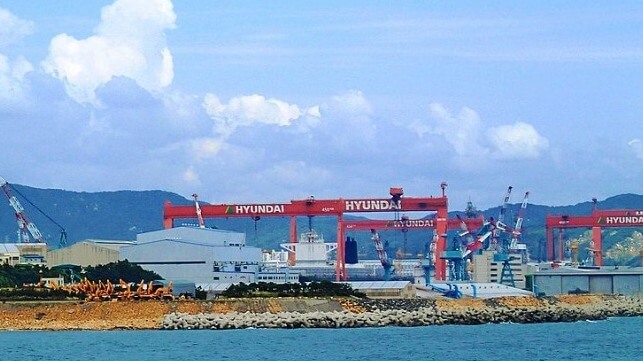Mounting Problems for South Korea’s Shipbuilding Industry

South Korean shipbuilders, which had recently led the industry as their Chinese rivals grappled with COVID-19-related restrictions, are facing growing challenges. The shipyards recently slipped back into second place for new orders and now despite a growing labor shortage, the government refused entry to welders recruited from Vietnam.
Experts recently predicted that South Korea’s shipbuilders are facing a growing labor shortage that could reach 10,000 people by mid-2023. To aid the industry the government said it would start new programs to encourage and subsidize vocational training to encourage young people to become shipbuilders and in the near term would increase the number of foreign work visas offered to skilled workers.
Media in Korea and Vietnam are reporting a growing scandal with unlicensed brokers that were recruiting people in Vietnam for the visas. Vietnam reportedly supplies as much as 40 percent of the welders working in South Korea’s shipyards. The reports say the South Korean government has denied entry to 1,150 welders as the Vietnamese government also warned of a testing scam and fraudulent workpapers. Under Korean rules, foreign workers are required to have two years of working experience and pass a proficiency test to receive a visa.
South Korea’s Ministry of Trade, Industry, and Energy announced on Monday that it was working with Vietnam and at the same time is launching a task force to address the growing labor shortage. While working with the Vietnamese government to resolve the fraud, they said they are also expanding recruiting efforts in Thailand, Sri Lanka, and Indonesia for welders.
The visa issues emerged as South Korea’s largest shipbuilder, Hyundai Heavy Industries detailed its plans to bring in foreign workers to address its immediate labor needs. The company plans to add 550 foreign workers as subcontractors starting this month. They said it would include 200 from Indonesia with additional experienced shipbuilders coming from China, Uzbekistan, and Vietnam. By the end of 2022, Hyundai reports it will have 2,000 foreign workers employed at its shipyards up from 800 in mid-2022. Overall, the shipbuilding industry as of the end of August reported employing 3,880 foreign laborers.
The continuing labor issues come as the shipbuilders are facing renewed competition from China’s shipbuilding industry after the South Koreans reported record order rates in the first part of 2022. According to monthly data from Clarkson Research Service released by Korea, its shipyards took in 42 percent of the orders in October compared to China’s 53 percent.
Despite the slip in recent months, South Korea’s largest shipbuilders have each reported reaching their yearly target for new orders. Hyundai reports total orders valued at $8.8 billion at the end of the first nine months while Daewoo Shipbuilding & Marine Engineering (DSME) said it set a new record for 2022. Yesterday they reported an order for an LNG carrier at a record $253 million to be built for Greece’s Maran Gas Maritime. Overall, DSME has achieved 117 percent of its order target for the year with orders for 38 LNG carriers, six container vessels, and one offshore plant, with a total value of $10.4 billion.
Overall Clarkson however reports that orders were down 28 percent in the first 10 months of the year and that the average price of newbuilds declined for the first time in 22 months. This comes as the Korean shipyard report rising costs including for the price of steel.
The Korean Export-Import Bank released a report this week forecasting further declines in shipbuilding. So far in 2022, South Korea’s industry has booked orders of 14.65 million compensated gross tonnage (CGT) with the economists projecting that it could fall to 8.5 million next year, or a drop of 42 percent. They estimated 2022 orders would total $38.5 billion while 2023 could fall to $22 billion.
Despite the potential for a short-term slowing in the year ahead, South Korea’s industry has an order backlog of 36.75 million CGTs with deliveries scheduled into 2025 and 2026. The economists point to the need to build new ships to meet the pending environmental regulations forecasting that shipbuilding orders will rebound in 2024.
